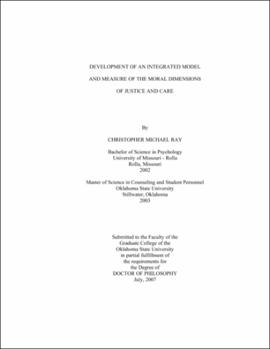| dc.contributor.advisor | Montgomery, Diane | |
| dc.contributor.author | Ray, Christopher Michael | |
| dc.date.accessioned | 2013-11-26T08:34:50Z | |
| dc.date.available | 2013-11-26T08:34:50Z | |
| dc.date.issued | 2007-07 | |
| dc.identifier.uri | https://hdl.handle.net/11244/7545 | |
| dc.description.abstract | Scope and Method of Study: The purpose of this study was to develop an operational definition of the Care dimension of moral theory and to develop an objective instrument to measure this definition and the dimension of Justice as represented by Rest's (1983) Four Component Model. The integration of the two dimensions was aimed at examining the relationship between them as well as to identify any demographic differences. Three phases of research were conducted to examine the content validity of the items using subject matter experts, to conduct item and structural analyses, and to examine the test-retest reliability of the instrument. | |
| dc.description.abstract | Findings and Conclusions: The overall results support the expansion of the Care dimension as well as its integration with the Justice dimension as promoted by Rest (1983). Initial evidence supporting the operational definition of Care was provided through the examination of content validity using subject matter experts. The high internal consistency reliabilities of the eight scales and the evidence of convergent and divergent validity provide additional support. An examination of the inter-correlations between the items and between the scales as well as the large resulting canonical correlation indicates that there is a strong positive relationship between the dimensions of Justice and Care as measured through this instrument. However, while females and males tend to score similarly on all four Justice scales, females tend to score higher on three of the four Care scales: Empathic Awareness, Compassionate Ideal, and Interpersonal Relatedness. Males, on the other hand, tend to score significantly higher on the fourth Care scale, Care-Efficacy. Further, there are generally moderate correlations between the Integrated Justice and Care Scales, the Morally Debatable Behaviors Scales, and the Prosocial Tendencies Measure scales. There were only small correlations between the IJCS and Marlow-Crowne Social Desirability Scale, indicating that scores on the IJCS were not generally influenced by a desire to respond in a socially acceptable manner. Thus, evidence exists to justify and support the expanded model. Further research is necessary to replicate and extend these findings. | |
| dc.format | application/pdf | |
| dc.language | en_US | |
| dc.rights | Copyright is held by the author who has granted the Oklahoma State University Library the non-exclusive right to share this material in its institutional repository. Contact Digital Library Services at lib-dls@okstate.edu or 405-744-9161 for the permission policy on the use, reproduction or distribution of this material. | |
| dc.title | Development of an integrated model and measure of the moral dimensions of justice and care | |
| dc.contributor.committeeMember | Bull, Kay | |
| dc.contributor.committeeMember | Carlozzi, Al | |
| dc.contributor.committeeMember | Fuqua, Dale | |
| dc.contributor.committeeMember | Harrist, R. Steve | |
| osu.filename | Ray_okstate_0664D_2439 | |
| osu.accesstype | Open Access | |
| dc.type.genre | Dissertation | |
| dc.type.material | Text | |
| thesis.degree.discipline | Educational Psychology | |
| thesis.degree.grantor | Oklahoma State University | |
